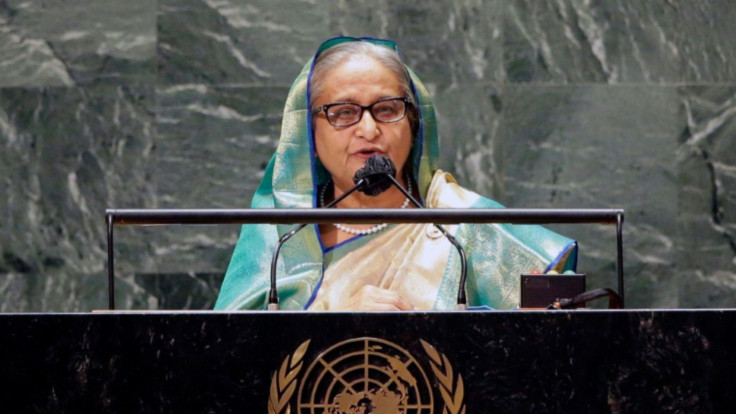India Under Pressure to Extradite Sheikh Hasina After Ex-PM Is Sentenced to Death for Brutal Crackdown

KEY POINTS
- Bangladesh urges India to return ex-PM Hasina after death sentence
- Security tightens in Dhaka as Hasina's death verdict sparks unrest
- India's dilemma grows as Bangladesh prepares fresh extradition bid
India is facing intense diplomatic pressure after Bangladesh's former Prime Minister Sheikh Hasina was sentenced to death for crimes against humanity, triggering uproar across South Asia and sending shockwaves through the international community.
Hasina, 78, one of the world's most recognisable female leaders and Bangladesh's longest-serving prime minister, was convicted in absentia for ordering a violent crackdown on student-led protests last year. The United Nations estimates that up to 1,400 people were killed, most of them shot dead by security forces during days of chaos that stunned the nation.
The dramatic verdict was delivered on Monday by the International Crimes Tribunal in Dhaka and immediately set off mass demonstrations, police clashes, and urgent diplomatic responses. Hasina, who has been in exile in India since being ousted in August 2024, called the ruling 'biased and politically motivated' and insists she is the victim of a political witch-hunt.
India Issues Rapid Statement as Pressure Mounts
New Delhi reacted within hours, releasing a carefully worded statement as global scrutiny turned towards India's responsibility to respond to any extradition request from Dhaka.
The Ministry of External Affairs posted on its website: 'India has noted the verdict announced by the International Crimes Tribunal of Bangladesh concerning former Prime Minister Sheikh Hasina. As a close neighbour, India remains committed to the best interests of the people of Bangladesh, including in peace, democracy, inclusion and stability in that country. We will always engage constructively with all stakeholders to that end.'
The swift response reflects India's deep unease. Hasina is living on its soil, protected under the country's hospitality yet now legally condemned by her homeland. Bangladesh is expected to file a fresh extradition request in the coming days, putting New Delhi in an extraordinarily difficult diplomatic position.
Our statement regarding the recent verdict in Bangladesh⬇️
— Randhir Jaiswal (@MEAIndia) November 17, 2025
🔗 https://t.co/jAgre4dNMn pic.twitter.com/xSnshW6AzZ
Why the World Is Shocked
For global audiences, the case is dramatic not only because it involves a former head of government, but because Sheikh Hasina has long been seen as a dominant figure in South Asian politics.
She ruled Bangladesh for more than 15 years, steering the country through rapid economic growth, major infrastructure projects, and a high-profile campaign against Islamist militancy. Under her leadership, Bangladesh became one of the fastest-growing economies in Asia.
Yet critics accused her of cracking down on dissent, weakening democratic checks, suppressing opposition parties and using security forces to silence student activists.
The protests that sparked her downfall began over a controversial jobs quota system, but exploded into nationwide fury after videos emerged showing police firing on crowds and beating unarmed demonstrators.
Investigators found Hasina, her interior minister and the national police chief responsible for allowing lethal force on the streets. Only the former police chief was present for the verdict.
International observers have been stunned by the speed at which the once-powerful leader has gone from dominating regional politics to facing execution.
Bangladesh on Edge as Violence Spreads
Following the announcement of the sentence, tens of thousands took to the streets in Dhaka. Police fired tear gas and sound grenades, while baton-wielding officers chased protesters through central intersections. Images showed terrified demonstrators fleeing clouds of gas and exploding munitions.
Crowds also rallied near Hasina's historic family home, demanding it be demolished. Others celebrated the verdict, cheering outside the courtroom as judges delivered the ruling.
The interim government led by Nobel Peace Prize laureate Muhammad Yunus called the sentence 'historic', vowing that attempts to create 'anarchy or chaos' would be harshly suppressed.
India Caught Between Alliance and Obligation
Hasina was one of India's closest regional allies, and Delhi maintained warm ties with her government for more than a decade. Handing her over to face execution risks a domestic and diplomatic backlash.
Yet refusing to extradite her could provoke a serious rift with Dhaka at a time when Bangladesh is already destabilised and preparing for national elections in February.
India's decision now carries enormous stakes. Returning Hasina could inflame politics on both sides of the border. Refusing could deteriorate relations with a neighbour vital to India's security and strategic interests.
As Bangladesh braces for more protests and its foreign ministry prepares its extradition request, the fate of Sheikh Hasina has become one of the most dramatic and consequential diplomatic dilemmas in the region — one that may reshape South Asian politics for years to come.
© Copyright IBTimes 2025. All rights reserved.





















